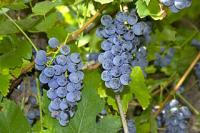
The study led by S. F. Dharmawardhane of Universidad Central del Caribe School of Medicine in Bayamon, Puerto Rico and colleagues found a combination of grape polyphenols at 0.5, 5 or 25 mg/kg significantly reduced the growth of breast cancer xenografts in a nude mouse model.
The authors say that grape polyphenols can prevent gynecological cancers like breast cancer as antioxidants, antiangiogenics, and selective estrogen receptor modifiers.
The combo used in the study consisted of the major polyphenols of red grapes including resveratrol, quercetin and catechin. Quercetin is also found in apples and catechin is found also in tea. These compounds each individually possess anticancer properties.
In the current study, the researchers first tested individual polyphenols, resveratrol, quercetin and catechin at a dose of 0.5 microM, and found none of them decreased breast cancer cell proliferation nor slowed cell cycle progression in vitro.
When resveratrol, quercetin and catechin were combined each at a dose of 0.5, 5 or 20 microM, they together significantly reduced cell proliferation and blocked cell cycle progression in vitro.
In a nude mouse model, the combined grape polyphenols at 0.5, 5 or 25 mg/kG inhibited primary tumor growth in breast cancer xenografts and the maximum inhibition was found at 5 mg/kG.
The researchers concluded "These results indicate that grape polyphenols may inhibit breast cancer progression."
S. F. Dharmawardhane and L. Castillo-Pichardo at University of Puerto Rico , Medical Sciences Campus in San Juan , Puerto Rico have recently published another study in the Oct, 2012 issue of Nutrition and Cancer to illustrate how these red wine polyphenols inhibit the breast cancer progression.
In vitro studies by the authors showed that the combination of resveratrol, quercetin and catechin induced apoptosis in gefitinib-resistant breast cancer cells through regulation of a range of proapoptotic proteins. Gefitinib is a selective inhibitor of epidermal growth factor receptor's (EGFR) tyrosine kinase domain.
The red grape polyphenols were also found to reduce the Akt activity, induce the activation of AMP kinase and inhibit mTOR signaling in the breast cancer cells with or without the presence of gefitinib although the combination of grape polyphenols and gefitinib was more effective than the individual treatments at inhibiting breast cancer growth and metastasis in nude mice.
The researchers concluded "RQC (resveratrol, quercetin and catechin) treatment inhibits breast cancer progression and may potentiate anti-EGFR therapy by inhibition of Akt/mTOR signaling."
Red grape polyphenols are available as supplements. Individual red grape polyphenols may also be available. To prevent breast cancer, long-term supplementation of these red grape polyphenols is advisable.
Other preventative measures including avoiding medical radiation and hormone therapy should also be considered to maximize the prevention against breast cancer, a disease that is diagnosed in more than 230,000 women in the United States each year, according to the National Cancer Institute.





